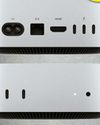While the new Pixel phones have attracted the most attention, Google’s third-generation Pixel Watch has introduced some big upgrades too. The most obvious is a new size option: you can still buy the familiar 41mm format for £349 inc VAT (or £449 with an LTE cellular connection), but for an extra £50 there’s now a version with a larger 45mm face, in a selection of three tasteful colour options.
Those extra millimetres make a big difference. The plus-sized model looks and feels more luxurious, yet it’s no thicker and weighs only 6g more. It also helps that Google has slimmed down the bezels, and pumped up the brightness on both models to a claimed peak of 2,000cd/m2 – double the Pixel Watch 2. The maximum refresh rate has been doubled too, to a smooth 60Hz.
Aside from the display, the main selling point of the Pixel Watch 3 is its improved health and fitness capabilities. Google says this year’s model incorporates the company’s most accurate heart-rate sensor yet, plus better running data with new metrics such as stride length, step cadence and vertical ratio joining the regular measurements of calories burned, distance covered, pace, elevation gain and average heart rate.
This story is from the November 2024 edition of PC Pro.
Start your 7-day Magzter GOLD free trial to access thousands of curated premium stories, and 9,000+ magazines and newspapers.
Already a subscriber ? Sign In
This story is from the November 2024 edition of PC Pro.
Start your 7-day Magzter GOLD free trial to access thousands of curated premium stories, and 9,000+ magazines and newspapers.
Already a subscriber? Sign In

Microsoft makes funeral plans for Windows 10
Extended support tariff and nag screens are ready for the October deadline

Are delivery drones finally ready for take-off?
More than a decade in the making, Amazon is again set to run a trial of its delivery drone in the UK. But there are better uses for delivery drones, explains Nicole Kobie

Sony PlayStation: the game changer
David Crookes looks at how the first PlayStation turned the gaming world on its head, impacting rival console manufacturers, videogame developers and the perception of games themselves

Apple M4 series
Don't expect revolution, but this is a notable all-round upgrade in performance for all members of the series

What is NUI?
Forget cryptic buttons and fiddly menus-Steve Cassidy explores a more intuitive approach to user interactions

Samsung Galaxy Chromebook Plus (2024)
Sleek, stylish and packing a superb OLED panel, this is the best high-end Chromebook since the Pixelbook

How can I make my IT truly sustainable?
It's not just about setting computers to sleep overnight; Nik Rawlinson finds out how to minimise your overall environmental impact

Apple Mac mini M4
Half the size of its predecessor yet packing far more power, this is the biggest Mac upgrade of the year

UPGRADE TO BUSINESSCLASS WI-FI
A HOME OFFICE DESERVES A PROFESSIONAL NETWORK. DARIEN GRAHAM-SMITH MAKES THE SWITCH

GIFTS FOR GEEKS 2024
IN OUR ANNUAL-ROUNDUP OF GIFT IDEAS FOR PEOPLE IMPOSSIBLE TO BUY FOR, WE COVER EVERYTHING FROM CHESS SETS TO PORTABLE BLUETOOTH TURNTABLES